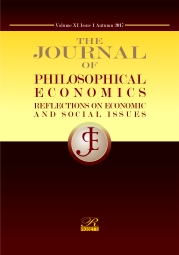Observing productivity: what it might mean to be productive when viewed through the lens of Complexity Theory
Observing productivity: what it might mean to be productive when viewed through the lens of Complexity Theory
Author(s): Manfred FüllsackSubject(s): Philosophy, Social Sciences, Economy, Special Branches of Philosophy, Sociology, Philosophy of Science, Social Theory, Socio-Economic Research
Published by: Editura Rosetti International
Keywords: productivity; complexity; observer-dependence; cybernetics; economic theory; computation; anticipatory systems;
Summary/Abstract: The paper tries to explore options and preconditions for a theoretically thoroughly grounded conception of productivity that is able to account for its observer-dependency and thereby meets the needs of a dynamic and highly differentiated modern society. It does so in respect to insights from Cybernetics and Complexity theory, thereby taking up charges about the contradiction of economic productivity and the Second Law of Thermodynamics. In respect to epistemological consequences of contemporary levels of productivity, a seemingly paradoxical constraint is put forward: the constraint that productivity is conditioned on being observed as such, with the observer in its turn being conditioned on productivity. The assumption is that this paradoxical constitution helps to keep productivity adaptive to the changes it itself incites in economy.
Journal: Journal of Philosophical Economics
- Issue Year: VI/2012
- Issue No: 1
- Page Range: 2-23
- Page Count: 22
- Language: English

